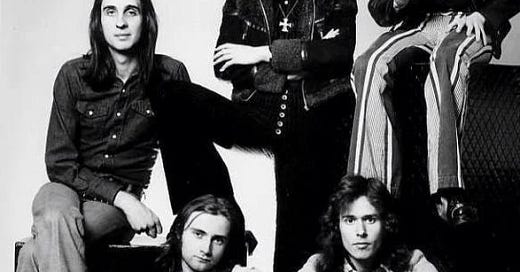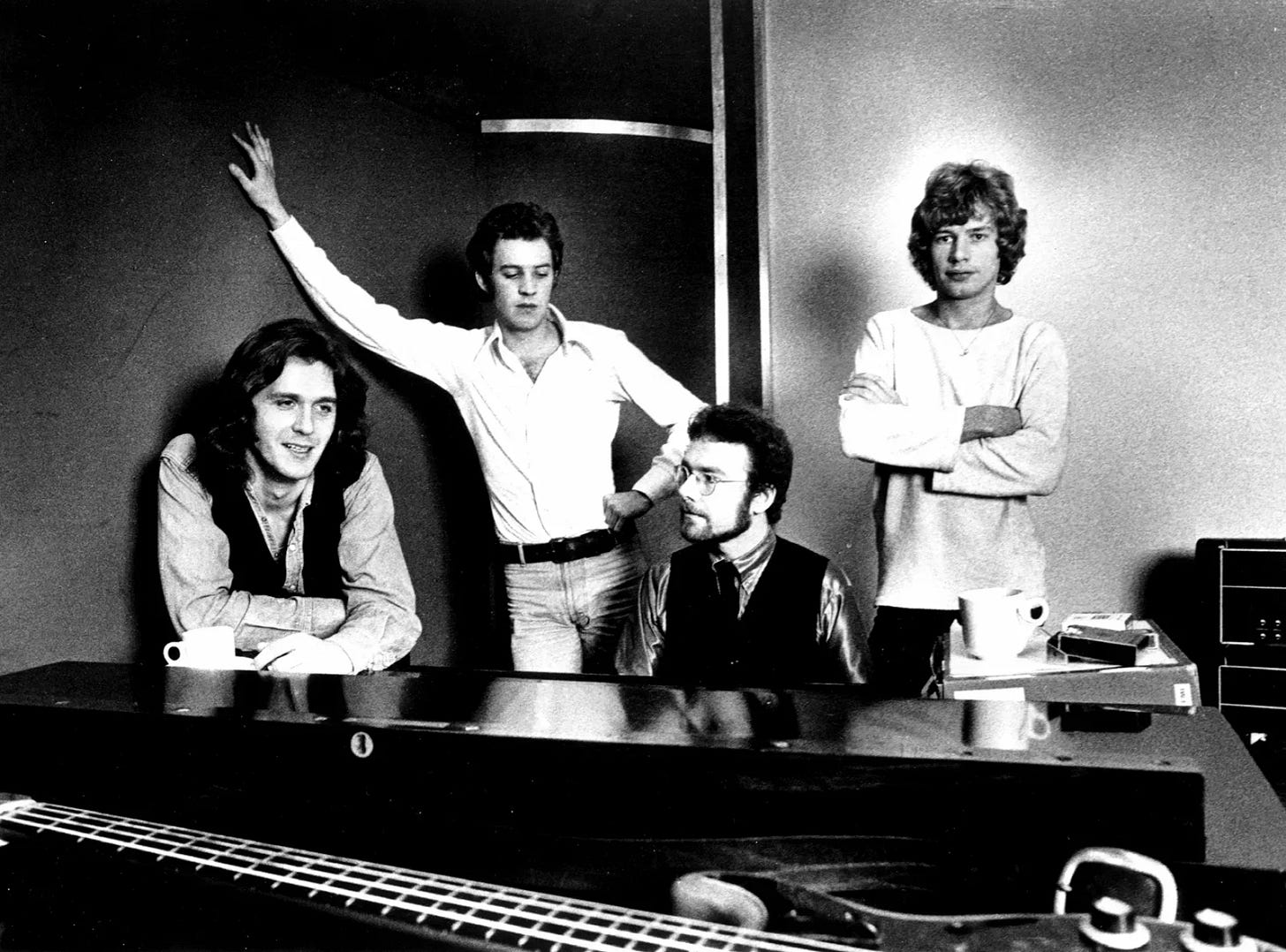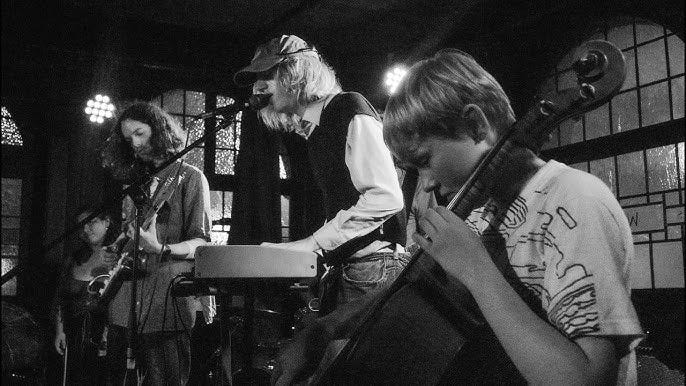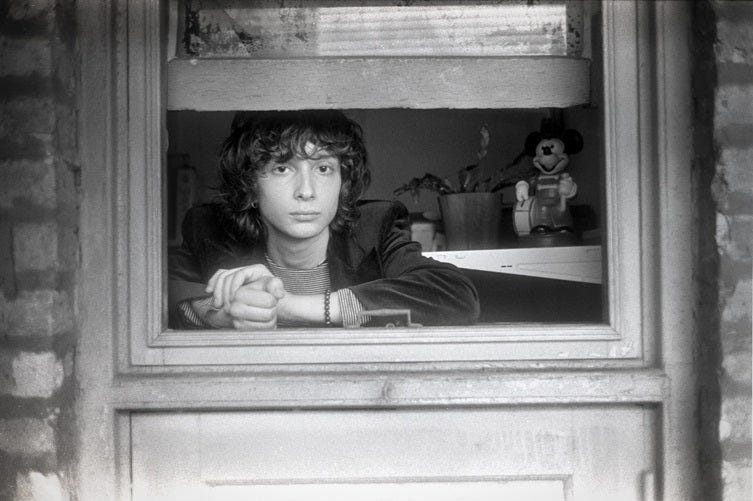There is a spectre haunting British music: prog.
Its presence quietly grew during the 2010s and, in the early 2020s, became overt. Today, the UK’s ‘indie’ scene is dominated by an extreme version of what I’m terming bourgeois neoprog. Sonically, it comes in many forms. Sometimes it’s like the prog of the 70s- that virtuosic blend of rock opera, jazz, classical and psychedelia. Sometimes it draws on the experimental fringes of 90s indie- bands like Slint, genres like slowcore and midwest emo. Often it’s a proggy elaboration on the post-punk revivalism of the 2010s, which was already quite proggy to begin with. Other times it’s some brand of deconstructed laptop music. What unites it all, though, is a commitment to the prog principles of intellectualism, experimentation and anti-melodicism. It is also, as per the name, highly bourgeois.
Before we continue, though, some admissions. I’m naturally biased against this music. My taste skews anti-intellectual and I only tend to appreciate sonic experimentation when it’s in the service of songcraft. I don’t listen to much ‘vibe’ music but when I do it tends to be melodic jazz or instrumental folk- sometimes a little leftfield but always palatable. I’m not an extremist. I even like a few of the obvious offenders. That new Black Country, New Road album, for instance, isgood! (Not just saying that because me and Taylor got wasted on their radio show). So let’s say centrist. Centre-right? 20% progressive experimentation vs 80% songcraft. Revolver era Beatles. Blue era Joni Mitchell. The poppier Arthur Russell songs. Late 50s Mingus. Though, to be honest, if that 80% is good enough, I’m willing to ditch the 20% for the most derivative pop slop available. I’m also, as you’ve likely guessed, middle class. I was raised by broke yet posh artist parents with obscure record collections. That said, I didn’t have any kind of musical education, and learned to play alongside my friends at our severely underfunded state school and in the Cardiff DIY punk scene. Either way, I’ll inevitably be arguing on subjective, slightly hypocritical grounds.
But ultimately I’m not bothered about parsing matters of taste. What I’m interested in is context. What social and economic parallels can we draw between UK indie music in 2025 and 70s prog? And how have contemporary factors like Spotify Mood Music and the death of DIY further facilitated the rise of bourgeois neoprog?
Let’s activate our clever clogs prog brains and find out.
Prog was born from time, freedom and money.
Sgt Pepper’s took The Beatles 129 days to record and was ten times more expensive than Please Please Me. And while its status as ‘the first prog album’ is inevitably disputed, many of the essential ingredients were there: ambitious chord progressions, classical ‘high art’ elements, a conceptual lyrical narrative. But it was still made by The Beatles so there were tunes. Late 60s bands like Soft Machine and King Crimson added some of that notorious virtuosity, scaled back the pop aspect and incorporated jazz elements. Some of these early prog pioneers- Greg Lake, Robert Fripp- were working class. So were The Beatles, obviously. But most, like Robert Wyatt and Syd Barrett, were middle class boys from places like Canterbury and Cambridge. And as the genre took hold and developed into the ‘high prog’ of bands like Genesis (formed in one of England’s most prestigious boarding schools) it became a predominantly middle-class phenomenon. Which makes sense. A classical education costs money, as do Moogs and Mellotrons. But it was also about time. Time to noodle, to twiddle, to smoke weed, listen to John Coltrane and read fantasy fiction.
This coincided with a period when the country was shifting away from the socially democratic post-war welfare state. The late sixties saw economic turbulence- stagflation, deindustrialisation- and growing pressure within Labour to rethink the welfare model. The election of Tory PM Edward Heath in 1970 saw a more intentional move from Keynesian Welfarism towards free market policy. In 73, Heath began to implement austerity measures and by the mid 70s, many of the ‘non-profitable’ cultural benefits- free art school, university grants etc- were being scrapped.
In the years following the 2008 crash, as a similarly recession-minded Tory government began implementing its own austerity measures, a similar shift took place. The landfill indie era- melodic, rock n roll indebted, fairly working class (or at least mockney)- gave way to the vaguely intellectual pop of The XX, Alt J and Foals. Less proggy but proudly public school coded bands like Mumford & Sons appeared. The Arctic Monkeys made that album about the hotel from space or whatever. And so it became clear that the real winners of Britpop were, in fact, Radiohead.
This again coincided with working class people being priced out of music. This time, however, there was less of a live music infrastructure to fall back on. Working class musicians of the mid 70s still had the option of, say, becoming a pub rock musician and grinding out performances each night to supplement their day jobs. Student Unions had been a vital part of this, but this circuit was decimated by 90s club culture, which allowed universities to choose the cheaper option of hiring individual DJs over bands. Soaring rents compounded the situation, wiping out purpose built venues and DIY spaces, and by the end of the 2010s, live music was something to be wedged between daytime pub hours and club nights. Streaming transformed musicianship into something closer to poetry: a rarefied pursuit available for those who don’t require or expect remuneration. Indie music became more of a niche concern. It also began to sound more niche, and the surviving legacy labels and publications hyped a kind of post-punk revivalism which was still proggy but in a less pop centred way: drawing on krautrock, post-rock and other acceptable forms of high minded guitar music.
Now this strand of alternative music has entered its ‘high prog’ phase, and the more extreme versions of this impulse are the most hyped. In a reversal of the booming music industry budgets of the 70s, which funded the stage spectacles and endless studio time required by prog bands, it’s now a lack of industry money which permits rampant experimentation. Ten years ago, a band like The Orchestra (For Now) or Mary in the Junkyard might have been cajoled into making more accessible music because of the potential for reaching a wider audience and making real money. But now, for whatever reason, an indie audience will accept higher levels of experimentation. Maybe it’s because Spotify has broadened the average listener’s horizons. Maybe it’s because they sound impressive on a festival stage. Maybe it’s the increasing tendency for music to be about vibes and atmosphere rather than songcraft- an issue Liz Pelly writes about in her book Mood Machine. Or maybe it’s because these so many of these bands are made up of kids who went to special music schools.
The idea of the conservatoire-to-indie pipeline is new. Those classically trained 70s prog musicians, for instance, received private tutelage and met fellow musicians in real music scenes rather than formal education settings. In the late 2010s, bands like Black Midi began to emerge from places like The BRIT School and Guildhall. I’m guessing this was a result of gen-x parents, many of them indie fans themselves, encouraging their offspring to pursue music. Gear was bought. Orchestra clubs were joined. For the first time, teens were applying for conservatoires to become alternative rockers. These bands inevitably absorbed the jazz and classical influences they were exposed to, and began applying them to an already proggy post-punk revival scene. Suddenly bands with seven or eight members began to show up- an unthinkable financial setup for the average musician. Mark E Smith, a figure of ironic influence in these circles, had some funny stuff to say about this before he died:
“They’ve been to rock college, and you can see it in the way they play. You used to send your son into the army or the clergy, now you send them into a rock group. If I go and see bands now, there’s more members of the group than there is audience. It’s all their aunties and their sisters.”
After years in the DIY scene, which could sometimes make a virtue of talentlessness, I found it striking to encounter this new generation of jazz noodlers and orchestra club nerds. I remember, maybe a year ago, watching a band who apparently had ‘industry interest’. The frontwoman behaved like a precocious child reciting theatre monologues at an East Dulwich barbeque. You could practically smell the Gordal olive brine. Behind her stood a group of friendly music students cycling through wacky jazz scales which sometimes sounded like Slint, sometimes like Genesis, mostly like a brain aneurysm. At the end of the set, the singer made a speech about how great music is while beaming and jumping up and down. I thought: is this what happened to the brains of those Covid teenagers? The Ipad babies?
Part of my research for this essay involved speaking to my dad as he’s now officially a historian of the 70s . His take on this education stuff was: “I think prog like ‘literary’ fiction lends itself to being marked like an exam- ‘nice use of obscure vocabulary/mellotron’ - you’re not required to use your own judgement as to whether you like it/or are moved by it. And that’s reassuring for lots of people -especially students- who worry about being wrong…writing a decent song is a whole different challenge and one that helicopter parents/music schools etc are unable to teach…” Nice one dad.
But I think this has happened in all kinds of ways. For instance, I’ve also begun to encounter young musicians who make some version of what Simon Reynolds calls ‘conceptronica’ - music born from the Fine Art or humanities PHD rather than the conservatoire. More Goldsmiths than Guildhall. Reynolds charts the emergence of this stuff in the 2010s:
At some point it seemed like a steady stream of press releases started arriving in my inbox that read like the text at the entrance of a museum exhibit. I also noticed that the way I would engage with these releases actually resembled a visit to a museum or gallery: often listening just once, while reading reviews and interviews with the artist that could be as forbiddingly theoretical as a vintage essay from Artforum.
I also know people studying the sonic opposite- a PHD in the history of folk music etc. But in all of these cases, a certain amount of charisma is lost when music is born from music school, academia or the helicopter parent bubble. Musical development involves exposure to different kinds of people, to subculture, to types of criticism which exist outside of crit-speak or marking criteria.
*
But look. I’m not saying it has a complete stronghold over alternative UK music- culture generally has become far too atomised to make such sweeping claims. But if what remains of the indie music industry continues to prioritise bourgeois neoprog in its various forms, everyone loses. Working class musicians still exist of course. They’re just increasingly making music via the accessible yet solitary technology of Logic and Ableton. Which is a shame, especially when loneliness is skyrocketing and Gen-Z apparently prefers pumping iron alone to the pub. Middle-class students can’t be the only musicians to experience a bitchy dysfunctional IRL music scene, a highly complex band dynamic, the joys of our country’s many service stations.
Here’s my solution: make music like The Tubs! Well not The Tubs, exactly, but, you know: low tech guitar pop. I’m aware this prog stuff is thought of as more contemporary sounding than say….The Tubs….but hear me out. Writing in Clash, Tom Morgan invokes Mark Fisher’s Slow Cancellation of the Future experiment (if you played this to someone in the 90s would it blow their mind?) and suggests bands like The Orchestra (For Now) and Man/Woman/Chainsaw would pass the Fisher test. I would simply say: they wouldn’t. If you played one of these bands to a music nerd in the 90s they’d probably just assume it was from some weirdo British post-rock scene they’d missed and say either ‘cool’ or ‘why?’. The reason Morgan and others think of it as contemporary is down to the fact that no one previously felt it necessary to blend prog, post-punk, post-rock, emo and jazz. Not that I turn my nose up at a bit of micro-genre blending. This is essentially what The Tubs do: we float over the past and combine elements we like: Husker Du, The Smiths, Fairport Convention, R.E.M. I just admittedly get a little salty when we’re called ‘retro’ and they’re called ‘innovative’ just because we’re being anachronistic in a less obscure and jarring manner….But, on a deeper level, I don’t really care about the entire premise of being forward-thinking. I think there’s more to music than breaking new ground. On an intellectual level, music sounding ‘contemporary’ is interesting to me. But on a visceral level, I care about the tone and individual quality of the songwriting.
So even if you’re not convinced on a sonic level, I still think guitar pop is more communal than laptop music and cheaper than a BRIT school education. And dare I say it….more fun. Who knows. Maybe some Luddite de-progression is just what the doctor ordered. You could be like those Sharp Pins and Horsegirl kids in Chicago with their ‘youth scene’. Make zines and pretend the modern world isn’t happening…… Or, I don’t know…..just something…. else. But please: no more bourgeois neoprog.









I used to enjoy the petty class warfare you’d read in NME reviews back in the day. Someone like Steven Wells would have torn Black Country New Road limb from limb for their pretentious public school affectations and I’d have loved reading it. All that has gone now and replaced with reverence because the music press are as posh as the bands.
As one of the rapidly aging dudes helping to prop up indie rock tours in the UK I've also first hand witnessed the shift to the bands of very nicely spoken young kids who have managed to find a cellist from somewhere.
But honestly, if I ask myself, it's not *just* the posh kids rock bands pushing out the working class kids that's the real problem for the 'rock thing', it's that there's really not that many punters for it full stop? Is it just a zero sum game where the audience is getting smaller and the posh kids have the resources to grab the bigger bite of the shrinking pie. Maybe i'm wrong, but the crowds at the shows (even for supposedly more up and coming stuff) skew older from what i've seen. The kids are listening to emo-trap or something, and good for them, I wouldn't curse them with my music taste.
I'm crap with spotting class stuff though, I don't think our family counts as proper working class, but we never had any money, so i'm screwed coming and going - I *like* Genesis (Collins and Gabriel eras), but didn't get a decent education either AND had to get a job at Safeway as soon as I was old enough.
I'm way more concerned by the shutting of the little indie venues that put on the new stuff, the odd stuff and the local stuff - I appreciate the MVT trying to prop them up, but is rock music a museum piece now? To be solely funded by the state as a cultural curiosity? I dunno.
That said! I'm probably just a misery because I can't get people to pay attention to my band, there is good stuff out there, caught you folks at End Of The Road last year and you were great.